LAWS 17995 - Legal Research & Writing: Law Society Cases Analysis
VerifiedAdded on 2023/06/10
|7
|1611
|181
Homework Assignment
AI Summary
This assignment comprises a legal memorandum analyzing two cases, Law Society of Upper Canada v. Lee and Law Society of Upper Canada v. Adams, along with the Law Society Act, R.S.O. 1990. The analysis covers various aspects such as obligations related to monies held in trust, penalties imposed by the tribunal, and factors considered while making costs awards. It delves into the misappropriation of trust funds, handling of records, and misleading the Law Society. The concept of 'exceptional circumstances' is discussed in relation to potential mitigation of penalties, drawing reference from relevant case laws like Law Society of Manitoba v Maclver and Bishop v Law Society of Upper Canada. Furthermore, the assignment addresses the duty to accommodate individuals with disabilities, referencing Law Society of Upper Canada v Czernik and the Ontario Human Rights Code. Finally, it examines specific sections of the Law Society Act, R.S.O. 1990, concerning the establishment of a paralegal committee, licensee responsibilities, and potential consequences for professional misconduct.
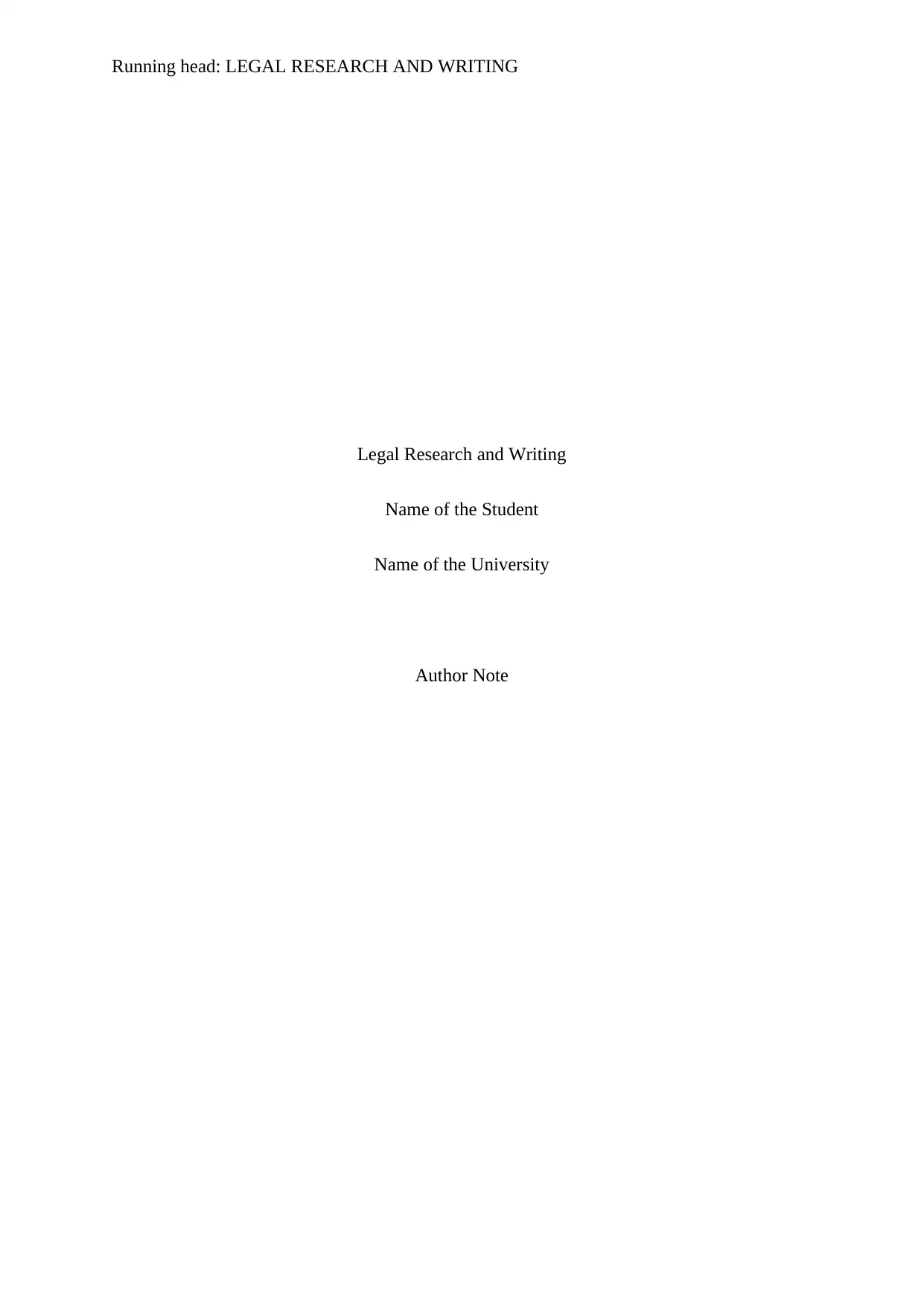
Running head: LEGAL RESEARCH AND WRITING
Legal Research and Writing
Name of the Student
Name of the University
Author Note
Legal Research and Writing
Name of the Student
Name of the University
Author Note
Paraphrase This Document
Need a fresh take? Get an instant paraphrase of this document with our AI Paraphraser
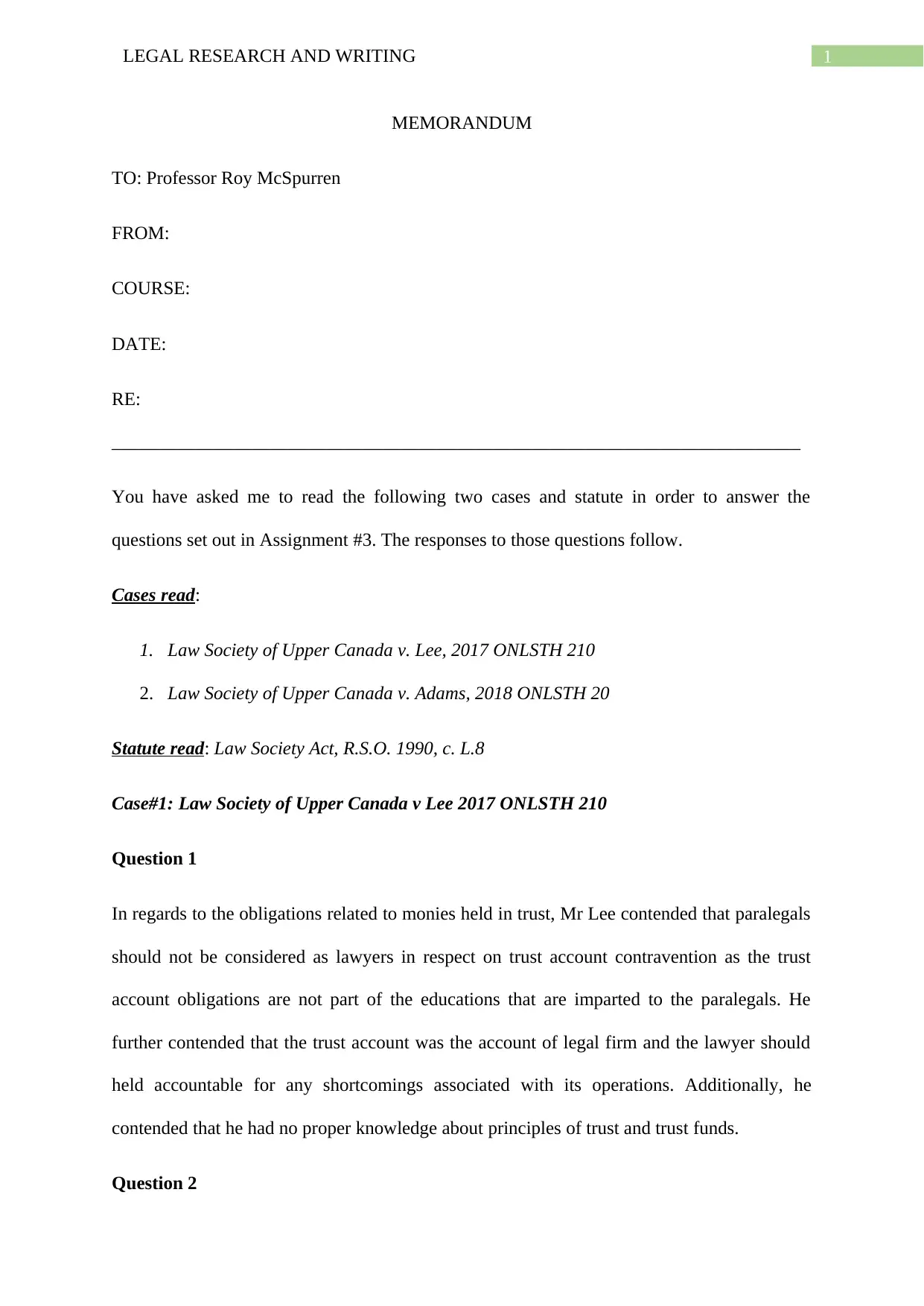
1LEGAL RESEARCH AND WRITING
MEMORANDUM
TO: Professor Roy McSpurren
FROM:
COURSE:
DATE:
RE:
__________________________________________________________________________
You have asked me to read the following two cases and statute in order to answer the
questions set out in Assignment #3. The responses to those questions follow.
Cases read:
1. Law Society of Upper Canada v. Lee, 2017 ONLSTH 210
2. Law Society of Upper Canada v. Adams, 2018 ONLSTH 20
Statute read: Law Society Act, R.S.O. 1990, c. L.8
Case#1: Law Society of Upper Canada v Lee 2017 ONLSTH 210
Question 1
In regards to the obligations related to monies held in trust, Mr Lee contended that paralegals
should not be considered as lawyers in respect on trust account contravention as the trust
account obligations are not part of the educations that are imparted to the paralegals. He
further contended that the trust account was the account of legal firm and the lawyer should
held accountable for any shortcomings associated with its operations. Additionally, he
contended that he had no proper knowledge about principles of trust and trust funds.
Question 2
MEMORANDUM
TO: Professor Roy McSpurren
FROM:
COURSE:
DATE:
RE:
__________________________________________________________________________
You have asked me to read the following two cases and statute in order to answer the
questions set out in Assignment #3. The responses to those questions follow.
Cases read:
1. Law Society of Upper Canada v. Lee, 2017 ONLSTH 210
2. Law Society of Upper Canada v. Adams, 2018 ONLSTH 20
Statute read: Law Society Act, R.S.O. 1990, c. L.8
Case#1: Law Society of Upper Canada v Lee 2017 ONLSTH 210
Question 1
In regards to the obligations related to monies held in trust, Mr Lee contended that paralegals
should not be considered as lawyers in respect on trust account contravention as the trust
account obligations are not part of the educations that are imparted to the paralegals. He
further contended that the trust account was the account of legal firm and the lawyer should
held accountable for any shortcomings associated with its operations. Additionally, he
contended that he had no proper knowledge about principles of trust and trust funds.
Question 2
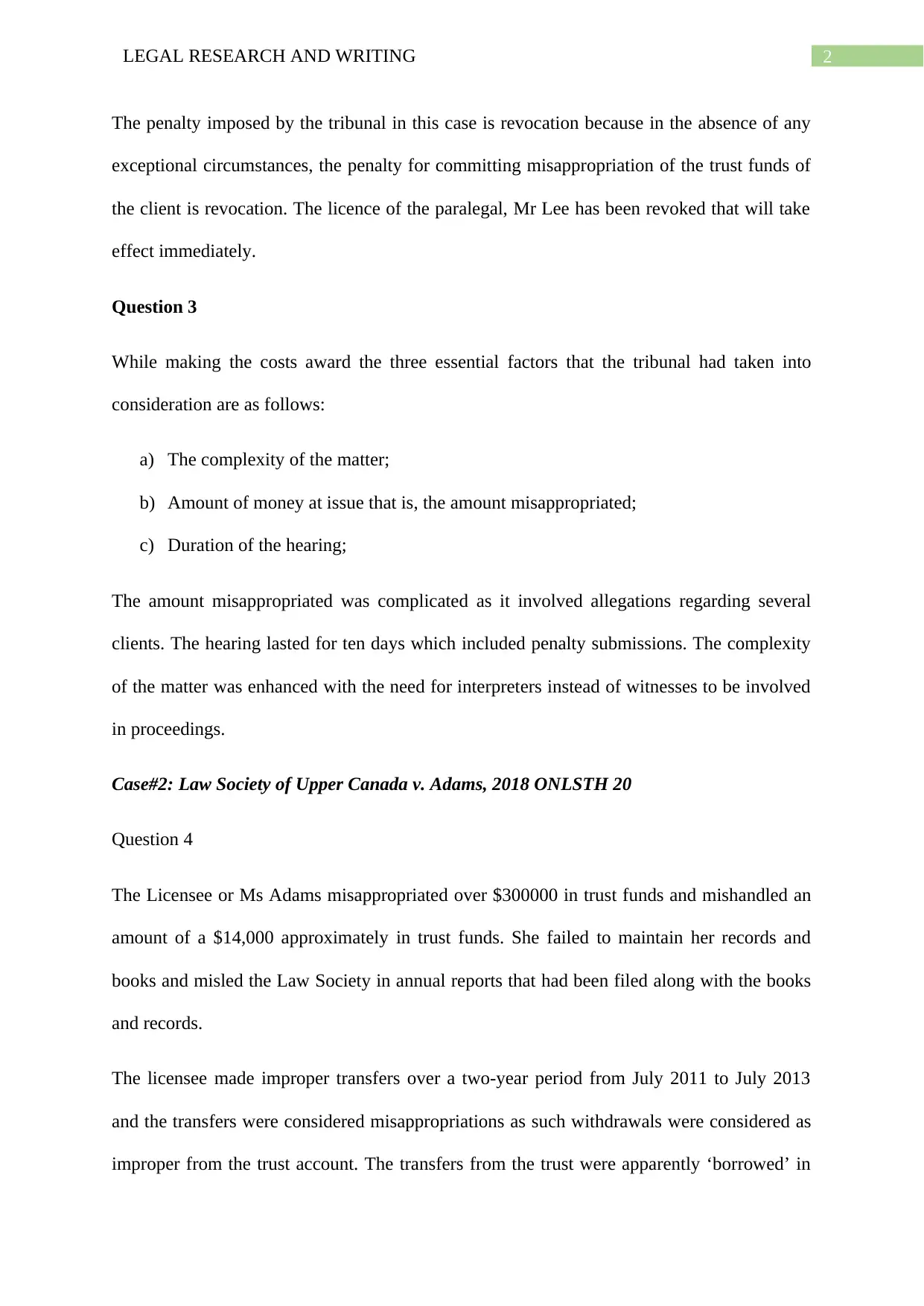
2LEGAL RESEARCH AND WRITING
The penalty imposed by the tribunal in this case is revocation because in the absence of any
exceptional circumstances, the penalty for committing misappropriation of the trust funds of
the client is revocation. The licence of the paralegal, Mr Lee has been revoked that will take
effect immediately.
Question 3
While making the costs award the three essential factors that the tribunal had taken into
consideration are as follows:
a) The complexity of the matter;
b) Amount of money at issue that is, the amount misappropriated;
c) Duration of the hearing;
The amount misappropriated was complicated as it involved allegations regarding several
clients. The hearing lasted for ten days which included penalty submissions. The complexity
of the matter was enhanced with the need for interpreters instead of witnesses to be involved
in proceedings.
Case#2: Law Society of Upper Canada v. Adams, 2018 ONLSTH 20
Question 4
The Licensee or Ms Adams misappropriated over $300000 in trust funds and mishandled an
amount of a $14,000 approximately in trust funds. She failed to maintain her records and
books and misled the Law Society in annual reports that had been filed along with the books
and records.
The licensee made improper transfers over a two-year period from July 2011 to July 2013
and the transfers were considered misappropriations as such withdrawals were considered as
improper from the trust account. The transfers from the trust were apparently ‘borrowed’ in
The penalty imposed by the tribunal in this case is revocation because in the absence of any
exceptional circumstances, the penalty for committing misappropriation of the trust funds of
the client is revocation. The licence of the paralegal, Mr Lee has been revoked that will take
effect immediately.
Question 3
While making the costs award the three essential factors that the tribunal had taken into
consideration are as follows:
a) The complexity of the matter;
b) Amount of money at issue that is, the amount misappropriated;
c) Duration of the hearing;
The amount misappropriated was complicated as it involved allegations regarding several
clients. The hearing lasted for ten days which included penalty submissions. The complexity
of the matter was enhanced with the need for interpreters instead of witnesses to be involved
in proceedings.
Case#2: Law Society of Upper Canada v. Adams, 2018 ONLSTH 20
Question 4
The Licensee or Ms Adams misappropriated over $300000 in trust funds and mishandled an
amount of a $14,000 approximately in trust funds. She failed to maintain her records and
books and misled the Law Society in annual reports that had been filed along with the books
and records.
The licensee made improper transfers over a two-year period from July 2011 to July 2013
and the transfers were considered misappropriations as such withdrawals were considered as
improper from the trust account. The transfers from the trust were apparently ‘borrowed’ in
⊘ This is a preview!⊘
Do you want full access?
Subscribe today to unlock all pages.

Trusted by 1+ million students worldwide
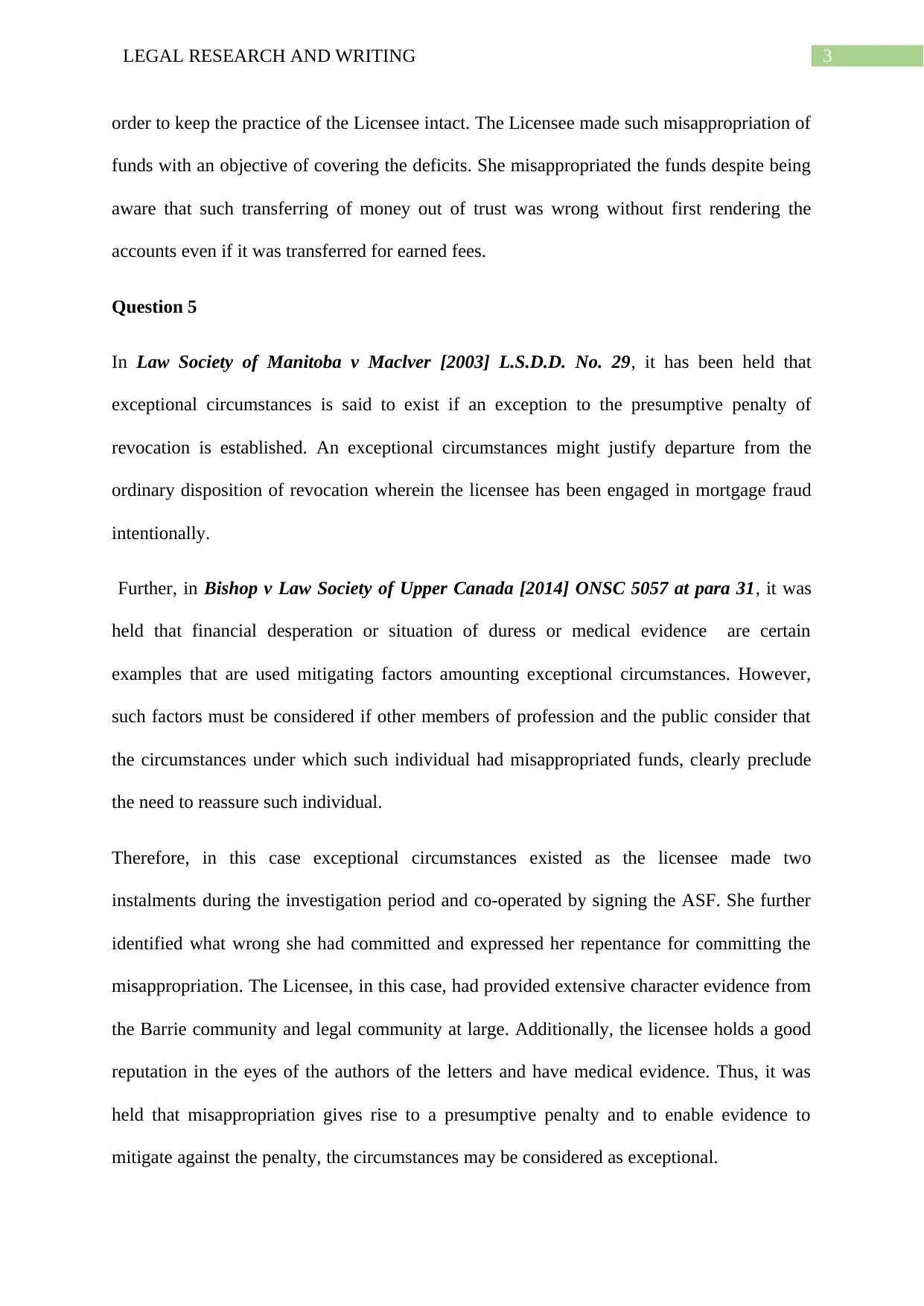
3LEGAL RESEARCH AND WRITING
order to keep the practice of the Licensee intact. The Licensee made such misappropriation of
funds with an objective of covering the deficits. She misappropriated the funds despite being
aware that such transferring of money out of trust was wrong without first rendering the
accounts even if it was transferred for earned fees.
Question 5
In Law Society of Manitoba v Maclver [2003] L.S.D.D. No. 29, it has been held that
exceptional circumstances is said to exist if an exception to the presumptive penalty of
revocation is established. An exceptional circumstances might justify departure from the
ordinary disposition of revocation wherein the licensee has been engaged in mortgage fraud
intentionally.
Further, in Bishop v Law Society of Upper Canada [2014] ONSC 5057 at para 31, it was
held that financial desperation or situation of duress or medical evidence are certain
examples that are used mitigating factors amounting exceptional circumstances. However,
such factors must be considered if other members of profession and the public consider that
the circumstances under which such individual had misappropriated funds, clearly preclude
the need to reassure such individual.
Therefore, in this case exceptional circumstances existed as the licensee made two
instalments during the investigation period and co-operated by signing the ASF. She further
identified what wrong she had committed and expressed her repentance for committing the
misappropriation. The Licensee, in this case, had provided extensive character evidence from
the Barrie community and legal community at large. Additionally, the licensee holds a good
reputation in the eyes of the authors of the letters and have medical evidence. Thus, it was
held that misappropriation gives rise to a presumptive penalty and to enable evidence to
mitigate against the penalty, the circumstances may be considered as exceptional.
order to keep the practice of the Licensee intact. The Licensee made such misappropriation of
funds with an objective of covering the deficits. She misappropriated the funds despite being
aware that such transferring of money out of trust was wrong without first rendering the
accounts even if it was transferred for earned fees.
Question 5
In Law Society of Manitoba v Maclver [2003] L.S.D.D. No. 29, it has been held that
exceptional circumstances is said to exist if an exception to the presumptive penalty of
revocation is established. An exceptional circumstances might justify departure from the
ordinary disposition of revocation wherein the licensee has been engaged in mortgage fraud
intentionally.
Further, in Bishop v Law Society of Upper Canada [2014] ONSC 5057 at para 31, it was
held that financial desperation or situation of duress or medical evidence are certain
examples that are used mitigating factors amounting exceptional circumstances. However,
such factors must be considered if other members of profession and the public consider that
the circumstances under which such individual had misappropriated funds, clearly preclude
the need to reassure such individual.
Therefore, in this case exceptional circumstances existed as the licensee made two
instalments during the investigation period and co-operated by signing the ASF. She further
identified what wrong she had committed and expressed her repentance for committing the
misappropriation. The Licensee, in this case, had provided extensive character evidence from
the Barrie community and legal community at large. Additionally, the licensee holds a good
reputation in the eyes of the authors of the letters and have medical evidence. Thus, it was
held that misappropriation gives rise to a presumptive penalty and to enable evidence to
mitigate against the penalty, the circumstances may be considered as exceptional.
Paraphrase This Document
Need a fresh take? Get an instant paraphrase of this document with our AI Paraphraser
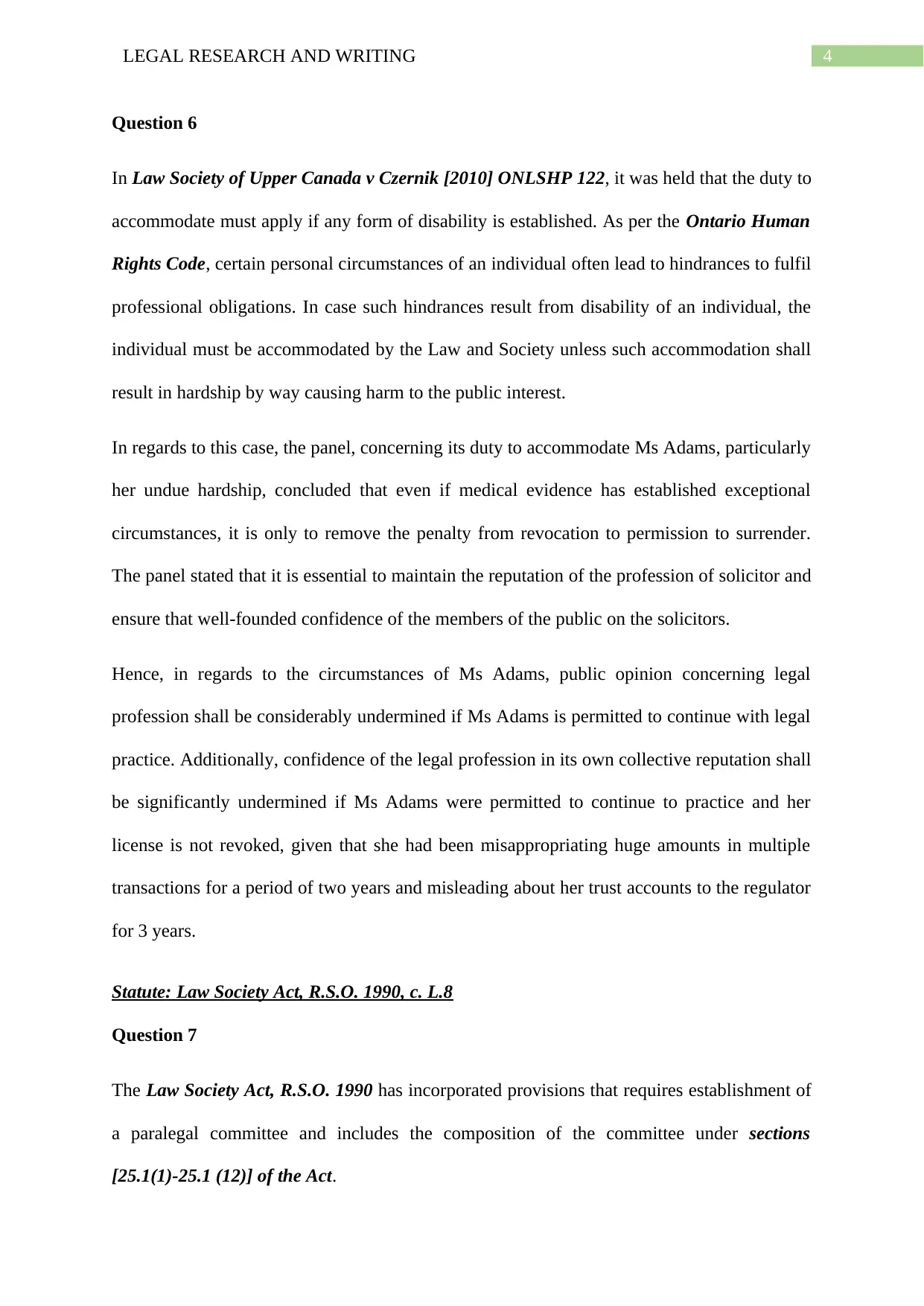
4LEGAL RESEARCH AND WRITING
Question 6
In Law Society of Upper Canada v Czernik [2010] ONLSHP 122, it was held that the duty to
accommodate must apply if any form of disability is established. As per the Ontario Human
Rights Code, certain personal circumstances of an individual often lead to hindrances to fulfil
professional obligations. In case such hindrances result from disability of an individual, the
individual must be accommodated by the Law and Society unless such accommodation shall
result in hardship by way causing harm to the public interest.
In regards to this case, the panel, concerning its duty to accommodate Ms Adams, particularly
her undue hardship, concluded that even if medical evidence has established exceptional
circumstances, it is only to remove the penalty from revocation to permission to surrender.
The panel stated that it is essential to maintain the reputation of the profession of solicitor and
ensure that well-founded confidence of the members of the public on the solicitors.
Hence, in regards to the circumstances of Ms Adams, public opinion concerning legal
profession shall be considerably undermined if Ms Adams is permitted to continue with legal
practice. Additionally, confidence of the legal profession in its own collective reputation shall
be significantly undermined if Ms Adams were permitted to continue to practice and her
license is not revoked, given that she had been misappropriating huge amounts in multiple
transactions for a period of two years and misleading about her trust accounts to the regulator
for 3 years.
Statute: Law Society Act, R.S.O. 1990, c. L.8
Question 7
The Law Society Act, R.S.O. 1990 has incorporated provisions that requires establishment of
a paralegal committee and includes the composition of the committee under sections
[25.1(1)-25.1 (12)] of the Act.
Question 6
In Law Society of Upper Canada v Czernik [2010] ONLSHP 122, it was held that the duty to
accommodate must apply if any form of disability is established. As per the Ontario Human
Rights Code, certain personal circumstances of an individual often lead to hindrances to fulfil
professional obligations. In case such hindrances result from disability of an individual, the
individual must be accommodated by the Law and Society unless such accommodation shall
result in hardship by way causing harm to the public interest.
In regards to this case, the panel, concerning its duty to accommodate Ms Adams, particularly
her undue hardship, concluded that even if medical evidence has established exceptional
circumstances, it is only to remove the penalty from revocation to permission to surrender.
The panel stated that it is essential to maintain the reputation of the profession of solicitor and
ensure that well-founded confidence of the members of the public on the solicitors.
Hence, in regards to the circumstances of Ms Adams, public opinion concerning legal
profession shall be considerably undermined if Ms Adams is permitted to continue with legal
practice. Additionally, confidence of the legal profession in its own collective reputation shall
be significantly undermined if Ms Adams were permitted to continue to practice and her
license is not revoked, given that she had been misappropriating huge amounts in multiple
transactions for a period of two years and misleading about her trust accounts to the regulator
for 3 years.
Statute: Law Society Act, R.S.O. 1990, c. L.8
Question 7
The Law Society Act, R.S.O. 1990 has incorporated provisions that requires establishment of
a paralegal committee and includes the composition of the committee under sections
[25.1(1)-25.1 (12)] of the Act.
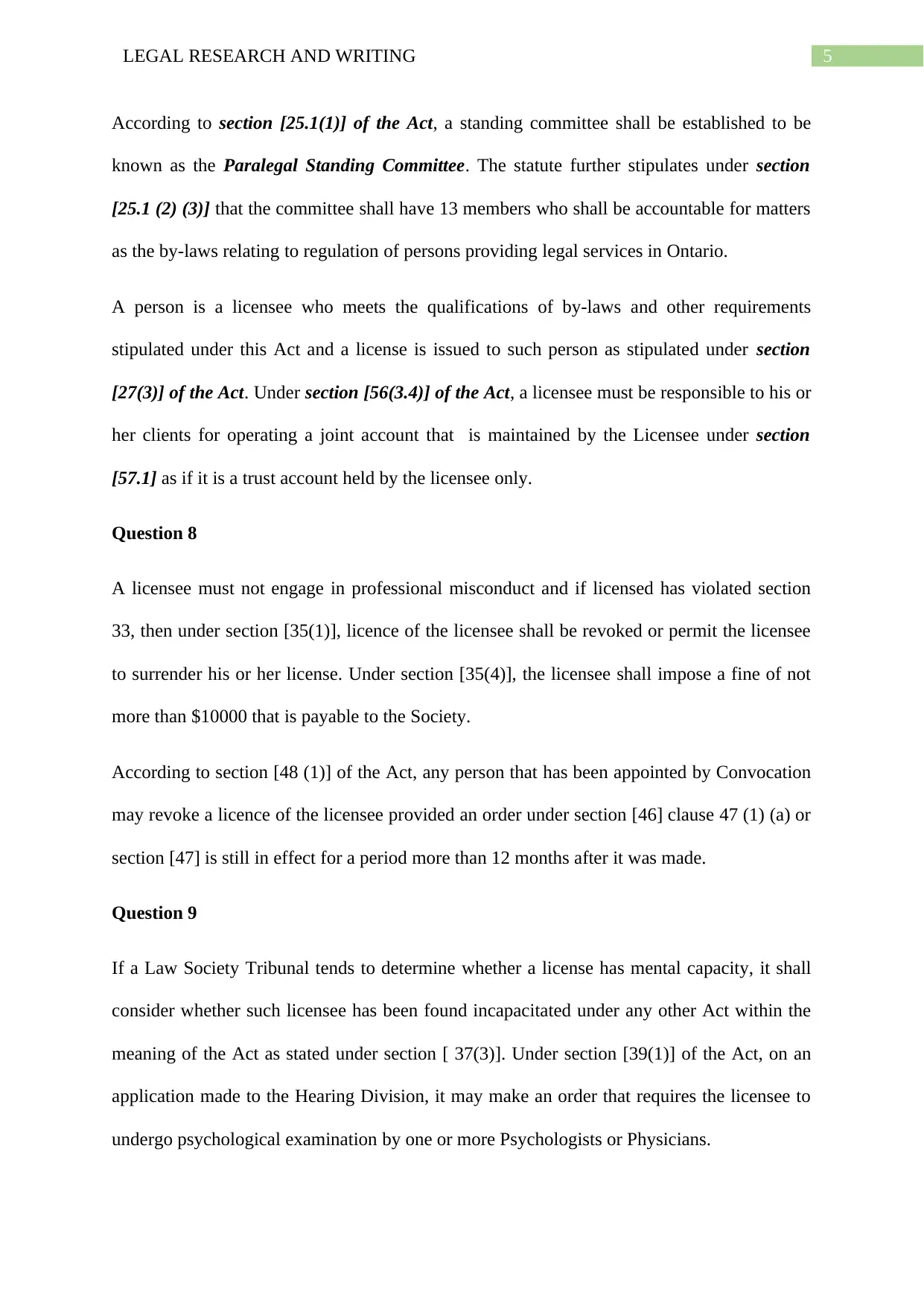
5LEGAL RESEARCH AND WRITING
According to section [25.1(1)] of the Act, a standing committee shall be established to be
known as the Paralegal Standing Committee. The statute further stipulates under section
[25.1 (2) (3)] that the committee shall have 13 members who shall be accountable for matters
as the by-laws relating to regulation of persons providing legal services in Ontario.
A person is a licensee who meets the qualifications of by-laws and other requirements
stipulated under this Act and a license is issued to such person as stipulated under section
[27(3)] of the Act. Under section [56(3.4)] of the Act, a licensee must be responsible to his or
her clients for operating a joint account that is maintained by the Licensee under section
[57.1] as if it is a trust account held by the licensee only.
Question 8
A licensee must not engage in professional misconduct and if licensed has violated section
33, then under section [35(1)], licence of the licensee shall be revoked or permit the licensee
to surrender his or her license. Under section [35(4)], the licensee shall impose a fine of not
more than $10000 that is payable to the Society.
According to section [48 (1)] of the Act, any person that has been appointed by Convocation
may revoke a licence of the licensee provided an order under section [46] clause 47 (1) (a) or
section [47] is still in effect for a period more than 12 months after it was made.
Question 9
If a Law Society Tribunal tends to determine whether a license has mental capacity, it shall
consider whether such licensee has been found incapacitated under any other Act within the
meaning of the Act as stated under section [ 37(3)]. Under section [39(1)] of the Act, on an
application made to the Hearing Division, it may make an order that requires the licensee to
undergo psychological examination by one or more Psychologists or Physicians.
According to section [25.1(1)] of the Act, a standing committee shall be established to be
known as the Paralegal Standing Committee. The statute further stipulates under section
[25.1 (2) (3)] that the committee shall have 13 members who shall be accountable for matters
as the by-laws relating to regulation of persons providing legal services in Ontario.
A person is a licensee who meets the qualifications of by-laws and other requirements
stipulated under this Act and a license is issued to such person as stipulated under section
[27(3)] of the Act. Under section [56(3.4)] of the Act, a licensee must be responsible to his or
her clients for operating a joint account that is maintained by the Licensee under section
[57.1] as if it is a trust account held by the licensee only.
Question 8
A licensee must not engage in professional misconduct and if licensed has violated section
33, then under section [35(1)], licence of the licensee shall be revoked or permit the licensee
to surrender his or her license. Under section [35(4)], the licensee shall impose a fine of not
more than $10000 that is payable to the Society.
According to section [48 (1)] of the Act, any person that has been appointed by Convocation
may revoke a licence of the licensee provided an order under section [46] clause 47 (1) (a) or
section [47] is still in effect for a period more than 12 months after it was made.
Question 9
If a Law Society Tribunal tends to determine whether a license has mental capacity, it shall
consider whether such licensee has been found incapacitated under any other Act within the
meaning of the Act as stated under section [ 37(3)]. Under section [39(1)] of the Act, on an
application made to the Hearing Division, it may make an order that requires the licensee to
undergo psychological examination by one or more Psychologists or Physicians.
⊘ This is a preview!⊘
Do you want full access?
Subscribe today to unlock all pages.

Trusted by 1+ million students worldwide
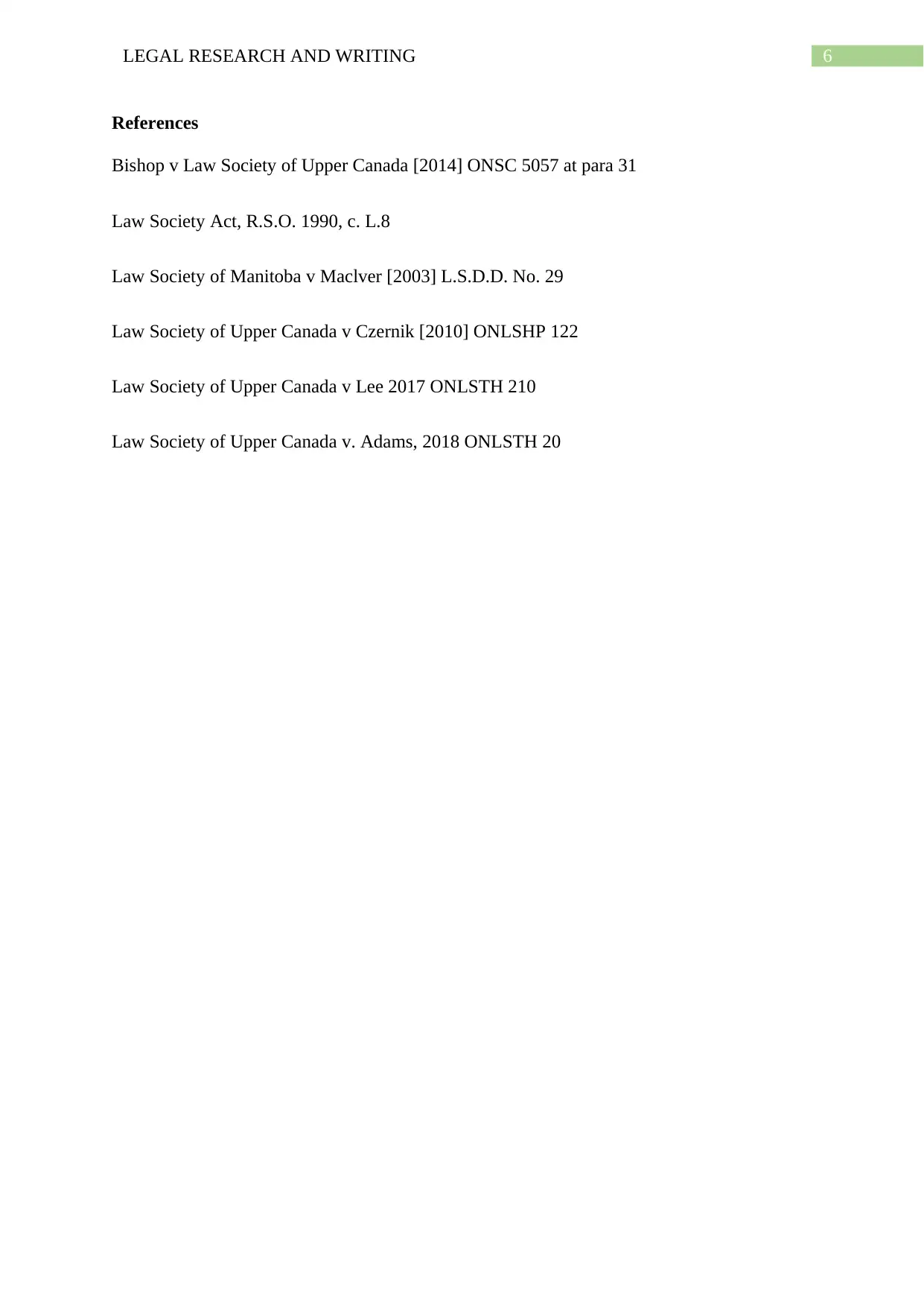
6LEGAL RESEARCH AND WRITING
References
Bishop v Law Society of Upper Canada [2014] ONSC 5057 at para 31
Law Society Act, R.S.O. 1990, c. L.8
Law Society of Manitoba v Maclver [2003] L.S.D.D. No. 29
Law Society of Upper Canada v Czernik [2010] ONLSHP 122
Law Society of Upper Canada v Lee 2017 ONLSTH 210
Law Society of Upper Canada v. Adams, 2018 ONLSTH 20
References
Bishop v Law Society of Upper Canada [2014] ONSC 5057 at para 31
Law Society Act, R.S.O. 1990, c. L.8
Law Society of Manitoba v Maclver [2003] L.S.D.D. No. 29
Law Society of Upper Canada v Czernik [2010] ONLSHP 122
Law Society of Upper Canada v Lee 2017 ONLSTH 210
Law Society of Upper Canada v. Adams, 2018 ONLSTH 20
1 out of 7
Your All-in-One AI-Powered Toolkit for Academic Success.
+13062052269
info@desklib.com
Available 24*7 on WhatsApp / Email
![[object Object]](/_next/static/media/star-bottom.7253800d.svg)
Unlock your academic potential
Copyright © 2020–2025 A2Z Services. All Rights Reserved. Developed and managed by ZUCOL.
